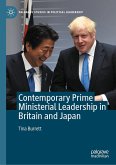This book illustrates the cyclical pattern in the kinds of dilemmas that confront political leaders and, in particular, disjunctive political leaders affiliated with vulnerable political regimes. The volume covers three major episodes in disjunction: the interwar crisis between 1923 and 1940, afflicting Stanley Baldwin, Ramsay MacDonald and Neville Chamberlain; the collapse of Keynesian welfarism between 1970 and 1979, dealt with by Edward Heath, Harold Wilson and James Callaghan; and the ongoing crisis of neoliberalism beginning in 2008, affecting Gordon Brown, David Cameron and Theresa May. Based on this series of case studies of disjunctive prime ministers, the authors conclude that effective disjunctive leadership is premised on judicious use of the prime ministerial toolkit in terms of deciding whether, when and where to act, effective diagnostic and choice framing, and the ability to manage both crises and regimes.
Bitte wählen Sie Ihr Anliegen aus.
Rechnungen
Retourenschein anfordern
Bestellstatus
Storno








